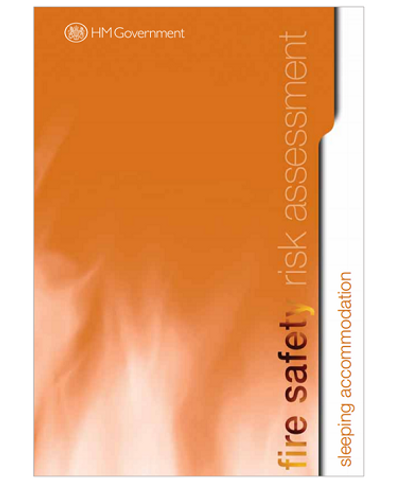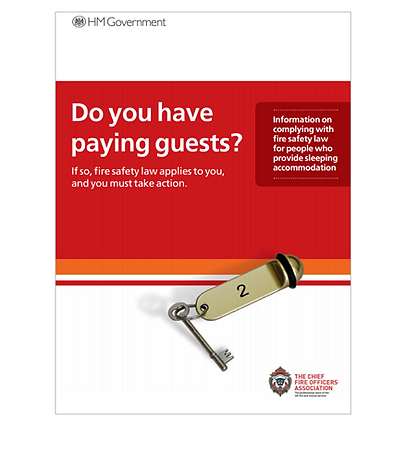ACCESS SOLUTIONS
for people with hearing loss
Fire safety
If you provide accommodation for paying guests in England or Wales, it is your legal responsibility to abide by the Fire Safety Law: this includes carrying out a Fire Safety Risk Assessment which takes into consideration 'who is at risk' and requires you to give consideration to the safe evacuation of vulnerable people (such as people with hearing loss who would not be alerted to a traditional fire alarm). In Scotland, owners are obliged to comply with the Fire (Scotland) Act 2005.
Making appropriate equipment and evacuation plans available to guests with hearing loss is enshrined in law in the UK. As an accommodation provider, it is your legal responsibility to ensure the safety of disabled guests in the event of an emergency and this includes guests with hearing loss.
To assist you in making your accommodation safe and to comply with the relevant legislation, we have gathered together links to the most valuable resources on fire safety and relevant legislation for accommodation owners in England, Wales and Scotland. Please also visit our 'Fire Safety Equipment' page.
England and Wales
'Fire Safety Risk Assessment: Sleeping Accommodation', HM Government
This guide covers England and Wales. It is divided into two parts:
-
Part 1 - Explains what fire risk assessment is and how you might go about it. Fire risk assessment should be the foundation for all the fire precautions in your premises.
-
Part 2 - Provides further guidance on fire precautions. The information is provided for you and others to dip into during your fire risk assessment or when you are reviewing your precautions.
This guide is for all employers, managers and owners of premises providing sleeping accommodation. It tells you about how you might comply with fire safety law, helps you to carry out a fire risk assessment and identify the general fire precautions you need to have in place.
It applies to premises where the main use is for sleeping accommodation. The premises addressed in this guide include:
-
all guest accommodation properties, e.g. bed and breakfasts, guest houses, inns, restaurants with rooms, and farmhouses;
-
self-catering accommodation (individual and multiple units), chalets, flat complexes, narrow boats and cruisers, caravan holiday parks (excluding privately owned units – unless they are sub-let);
-
hotels, motels, holiday villages, serviced apartments and aparthotels.
Dowload the guide in English here. The Welsh language version available to download here.
'Do you have paying guests?', HM Government
If you provide accommodation for paying guests in England and Wales this booklet is designed to help you.
It gives people who own small bed and breakfasts (B&Bs), guest houses, self-catering accommodation and inns with rooms simple information on how to comply with the law.
It also offers you some practical advice on what fire precautions may be necessary to ensure your premises are safe.
It will:
• tell you how to comply with the law by carrying out a fire risk assessment;
• provide you with a five-step guide to help you carry out that risk assessment;
• answer your questions;
• tell you where you can get information; and
• give you practical advice on what fire safety measures may be appropriate to provide an adequate level of fire safety in premises which are similar in size to a family home.
Click here to download the free booklet.
'Fire Safety Risk Assessment: Means of escape for Disabled People', HM Government
This is a supplementary guide and should be read alongside other guides in
the Fire Safety Risk Assessment series. It provides additional information on accessibility and means of escape for disabled people.
To download the free guide here.
Scotland
'Practical Fire Safety Guidance for small bed & breakfast and self-catering accommodation', Safer Scotland
The guidance is for proprietors of B&B properties and self-catering properties
which:
-
are offered as accommodation for self-catering holidays, to be occupied by not more than 10 persons; or
-
offer accommodation for not more than eight bed and breakfast guests in the home of the resident operator; and, in either case:
-
have a means of escape from bedrooms via a traditional ‘hall’ with at least one exit directly to the outside, rather than by way of a living or kitchen area;
-
do not have letting or guest accommodation below a ground floor or above a first floor;
-
do not act as the principal residence for paying guests;
-
do not have any storey area over 200m2 internal floor space.
Download the free booklet here.
'Practical Fire Safety Guidance for small premises providing sleeping accommodation', Safer Scotland
This guide has been produced to assist those who have responsibility for ensuring fire safety in certain flats, maisonettes and other small premises which provide sleeping accommodation in Scotland. The Fire (Scotland) Act 2005, as amended, introduced changes to fire safety law in Scotland and repealed previous fire safety legislation. Sections 53, 54 and 56 of the Fire (Scotland) Act 2005 place a duty on employers, employees, managers, owners and others in relation to fire safety. The guide may also be helpful to all other persons with a role in ensuring fire safety in premises providing sleeping accommodation.
This guidance has been prepared by the Scottish Government, and is one in a series of guidance documents aimed at offering fire safety advice for different types of premises.
The scope includes buildings or premises put to a variety of uses, such as small hotel, boarding house, hostel, HMO subject to licensing, self-catering or bed and breakfast accommodation: but certain small premises used for self-catering holidays or bed and breakfast, for which there is separate guidance, are excluded from this guide. Separate guides are available for medium and large premises and for specific small self-catering and bed and breakfast premises.
Download the guide here.
'Practical Fire Safety Guidance for medium and large premises providing sleeping accommodation', Safer Scotland
This guide has been produced to assist those who have responsibility for ensuring fire safety in certain premises providing sleeping accommodation in Scotland. The Fire (Scotland) Act 2005, as amended, introduced changes to fire safety law in Scotland and repealed previous fire safety legislation. Sections 53, 54 and 56 of the Fire (Scotland) Act 2005 place a duty on employers, employees, managers, owners and others in relation to fire safety. The guide may also be helpful to all other persons with a role in ensuring fire safety in premises providing sleeping accommodation.
This guidance has been prepared by the Scottish Government, and is one in a series of guidance documents aimed at offering fire safety advice for different types of premises.
This guidance applies to such premises which comprise of:
• Any single storey area over 200 m2;
• 3 storeys in height with a single storey area over 100 m2; or
• More than 3 storeys in height.
Download the guide here.
GENERAL ADVICE
Trip Advisor's Advice for Holiday Lets
In October 2006, the 'Regulatory Reform (Fire Safety) Order 2005' came into effect in and replaced over 70 pieces of fire safety law. The changes replaced the need for fire certificates, which have now been abolished and no longer have legal status.
The new legislation affects all businesses and places where anyone could conceivably be at risk should a fire occur. This includes all forms of sleeping accommodation, such as self-catering properties and B&Bs or guesthouses sleeping up to six guests, which were not previously affected. Source: fire-assessments.co.uk; communities.gov.uk; oxfordshirecotswolds.org; VisitBritain - The Pink Booklet 2007/08 Legislation for tourist accommodation.
Read more here.
Fire Safety Advice Centre
This site is a free fire safety and fire prevention advice portal and was originally set up by Tom Sutton for Merseyside Fire Liaison Panel. The Merseyside Fire Liaison Panel was a voluntary organisation and was aiming to promote fire safety in the Merseyside area.
In January 2011 the site was passed on to Safelincs Ltd, a fire safety product company, with the aim to update and further develop the fire safety information offered on the site.
If you own or manage acommodation in England, please read: Fire Safety for Special Needs Groups
Statistics
Fire Statistics 2012-2013
In December each year the Department for Communities and Local Government publishes the annual fire statistics for Greaty Britain.
This report highlights that, in 2012-13, there were 41,000 dwelling fires in Britain and 266 dwelling fire fatalities. (The report does not differentiate between domestic dwellings and paid sleeping accommodation.)
It states, "34% of fire-related deaths in Britain were caused by the victim being overcome by gas, smoke or toxic fumes. The other leading causes are burns alone (30%) and a combination of burns and being overcome by gas or fumes (19%)."
Read the full report here.








